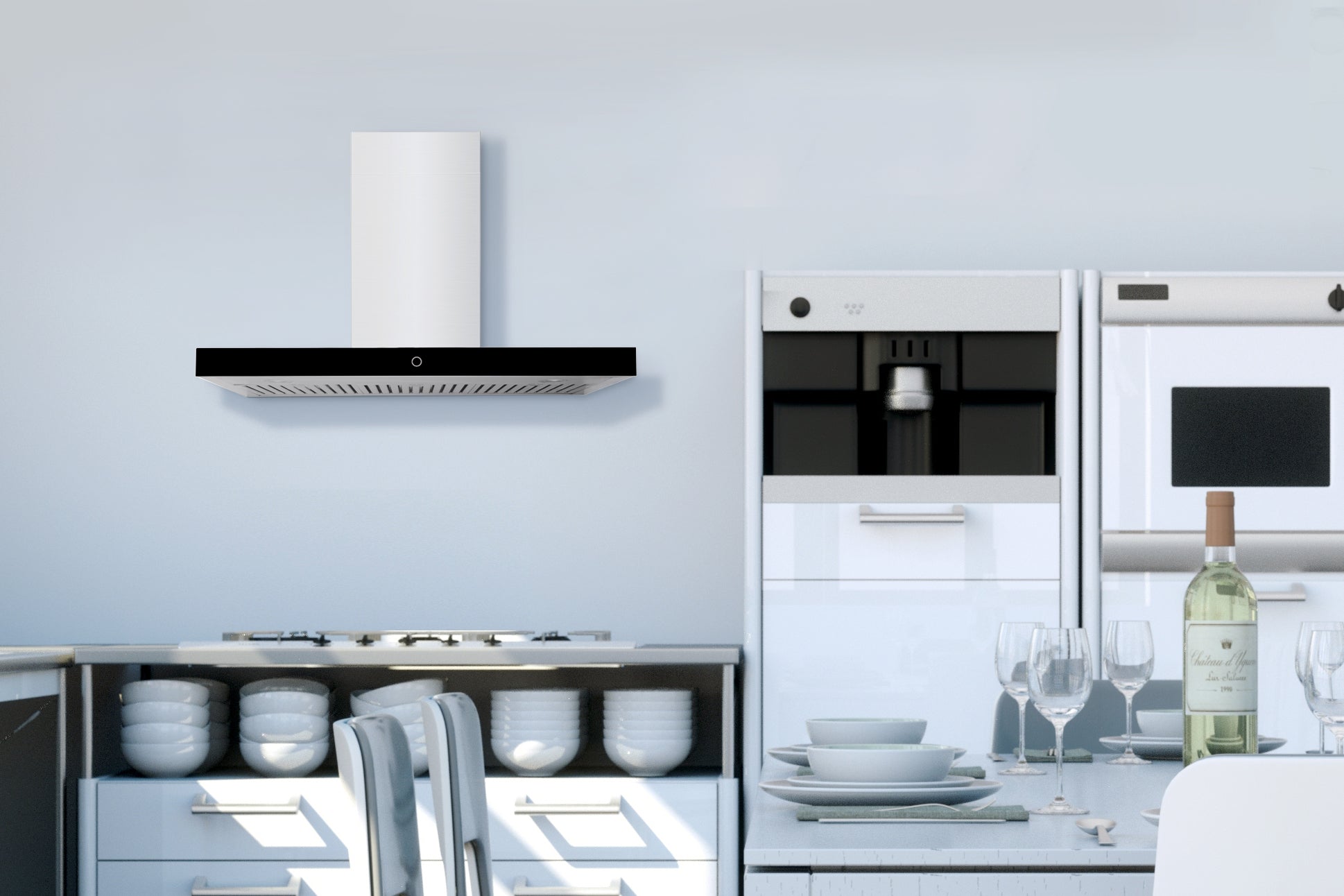Range Hoods: How to Know If a Ducted or Ductless Model is Best for Your Kitchen

TIPS & GUIDES
Ducted vs. Ductless Range Hoods
By Hauslane ∙ 5 mins read
At Hauslane, we like to think of range hoods as the unsung hero of kitchen appliances. These workhorses do everything from removing excess hot air from the kitchen to trap sticky grease before it has a chance to damage your kitchen. They’re vital for keeping your kitchen clean and safe. Range hoods remove harmful chemicals and known carcinogens from the air.
Range hoods have changed a good deal over the years. You have plenty of options on the market with different styles, sizes, finishes, performance levels, and more. But if you’re wondering, “Do range hoods have to be vented outside?” We’ve got answers below about choosing a ducted vs. ductless range hood and information about the reasons why (and why not) to choose one or the other. At Hauslane, we can show you new solutions to your kitchen’s range hood and help you decide between using ducted or ductless range hoods.

How Range Hoods Work
Before we break down whether a ducted (also referred to as vented) or ductless range hood makes the most sense for your needs, let’s do a crash course on range hoods and how they work.
Kitchen vent hoods typically have a single or dual-motor system. The motors suck in fumes and exhaust created by cooking in your kitchen. This air and chemicals are then vented through ductwork to the exterior of your home. It may also be recirculated through charcoal filters (an important kitchen accessory) if you have a ductless model.
Signs You Should Choose a Ducted Range Hood
The best way to determine what type of range hood you need? By your kitchen and cooking needs! There are pros to both ducted and ductless range hoods. Here are the main reasons a ducted range hood is the best choice for your needs:
You have a gas range oven and stove
Cooking with gas? Gas is preferred by many home cooks and professional chefs for its precise heat control. When you use a gas range, they emit a good deal of fumes, water vapor, and even carbon monoxide. These gases need to be vented outside of your home. Otherwise, you risk feeling sick, lingering fumes, and mold. In this case of deciding between a ducted or ductless range hood, a ducted hood is your best option.
You’re reverting to open windows and doors to air out your kitchen
Maybe you’re a fan of making stir fry meals. Maybe you cook multiple meals a day. Or maybe you tend to leave your meals a little on the charred side. Whatever the reason, a vented range hood can knock out lingering smells, steam, and smoke fast.
If you’re always having to open a door or crack a window, a vented model is most likely your best choice.
You want all the functionality
Vented range hoods are a triple-threat. They remove fumes, cool the kitchen, and trap grease. That leaves your kitchen cleaner and more comfortable. If you’re looking for all three from your range hood, go with a ducted model.
You want to save on utility costs
When choosing between a ducted or ductless range hood, you should know that ducted range hoods use less fan power in general than ductless models. This is because the appliance traps fumes from your kitchen and circulates them outdoors. Overall, it requires less use of the blower in the long run.
Shop Ducted Collection
From HAUSLANESigns You Should Choose a Ductless Range Hood
Ductless models have increased in popularity due to their flexibility and ease of use. If you’re considering going ductless, here are some signs it’s a good fit for your needs.
You don’t have or don’t want to add ducting
If you wanted a ducted range hood, you’re going to need ducts. Things get especially tricky if your stove isn’t located on an outside wall. With a ductless model, you won’t need to add ducts to redirect the air outside.
You have limited kitchen space
With a ducted range hood, you’ll need a piping system to direct the gases outside. In a smaller kitchen such as those found in a condo or apartment, a ductless model is a better fit. You won’t need to add ducting prior to installation.
You want flexibility on where to install
Ductless range hoods are known for being very flexible on kitchen layouts. You can place them below a cabinet, over an island, or wherever makes the most sense in your kitchen. This gives you more space to find the ideal location that suits your kitchen’s layout and design.
That also means if you want to move your stove in the future, you’ll have more freedom to relocate your range hood.
Ultimately, the answer to the ducted vs. ductless range hood question depends on your kitchen and cooking style. To learn more about how to get the most out of your kitchen appliances (whether they’re ducted or ductless), stay tuned to the Hauslane blog. For more information on choosing between a ducted or ductless range hood for your kitchen, get in touch with Hauslane today.


